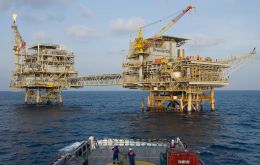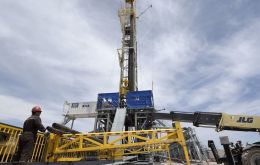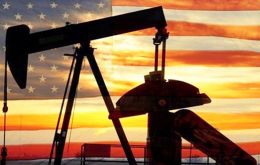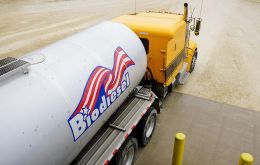MercoPress. South Atlantic News Agency
Energy & Oil
-
Wednesday, November 21st 2018 - 08:17 UTC
Khashoggi syndrome: Crude prices at their lowest since 2017; fears of further market volatility

Crude prices hit their lowest level since 2017 on Tuesday, sliding further into a bear market after President Donald Trump signaled the US would not punish Saudi Arabia, the world’s largest oil exporter, over the killing of Washington Post journalist Jamal Khashoggi in its Istanbul consulate.
-
Saturday, November 17th 2018 - 08:56 UTC
Premier Oil confident in reducing debt; begins drilling in Mexico

Premier Oil said it expected full-year production to come in at the low end of a previously announced 80,000 to 85,000 barrels per day range. The company, with interests in the Falkland Islands and which has been focusing on cutting debts, also said its debt pile would shrink to US$ 2.4 billion by the year-end.
-
Tuesday, November 13th 2018 - 08:30 UTC
YPF faces weaker gas demand and shifts focus to Vaca Muerta shale oil

Argentina's energy company YPF said on Monday its 2018 hydrocarbon production likely will fall by 3% to 4% on the year, more than previously expected, as low natural gas demand forces it to close wells and shift its focus to Vaca Muerta shale oil.
-
Monday, November 12th 2018 - 18:13 UTC
Oil producing countries agree on need to cut down crude output due to oversupply

They call it “production adjustments,” but in reality most major oil extracting countries agreed Sunday new strategies regarding crude output were needed in light of the surplus accrued over the past few months.
-
Monday, November 12th 2018 - 01:48 UTC
Axion cuts down fuel price in Argentina

Fuel retailer Axion cut down its prices by 3.2% in Argentina, in line with declines of both the US dollar exchange rate and the international oil barrell, it was reported Saturday. Other companies are expected to follow suit shortly.
-
Friday, November 9th 2018 - 08:27 UTC
Oil down 20% from its October peak despite US sanctions on Iran

Oil markets on Friday remained weak as rising supply and concerns of an economic slowdown pressured prices, with U.S. crude now down by 20% since early October. U.S. West Texas Intermediate (WTI) crude oil futures were at US$ 61.63 per barrel.
-
Friday, November 9th 2018 - 08:17 UTC
Argentine bio-fuel industry hopeful 2017 US taxes will be reviewed

The U.S. decision to review its tariffs on Argentine biodiesel could mean a reversal of fortune for exporters whose shipments from South America have been practically nil, the biodiesel chamber of Argentina said on Thursday.
-
Friday, November 9th 2018 - 07:29 UTC
Argentina launches off-shore bidding in the Austral and Malvinas regions

Argentina has launched its first offshore bidding round in nearly three decades. The country's energy secretariat published details regarding bidding terms and conditions for public bidding for exploration licenses.
-
Thursday, November 8th 2018 - 07:34 UTC
US oil output hits another record, but prices and world market remain volatile

Oil prices slipped on Wednesday, continuing a recent slide after surging U.S. crude output hit another record and domestic inventories rose more than expected. The U.S. Energy Information Administration (EIA) said domestic crude inventories rose 5.8 million barrels in the latest week, more than double analysts’ expectations.
-
Thursday, November 8th 2018 - 07:11 UTC
US to review antidumping duties on biodiesel imported from Argentina

The U.S. Commerce Department said it would begin a review of antidumping duties it placed last year on biodiesel imported from Argentina, the Argentine Foreign Ministry said in a statement on Wednesday.
